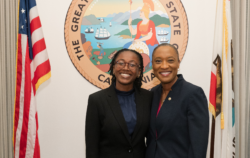
Smith Scholar Focuses on Geoscience Studies, Climate Change Research
Vivienne Maxwell, a senior Posse Scholar at Smith College, is working towards a degree in statistical and data sciences and geosciences, with a focus on climate change through ancient climate studies.
Vivienne’s focus on geoscience began during her very first semester at Smith when she became curious about a professor’s paleontological research. She spent the following three years joining that very study to extract microfossils from Nevada, analysis that later developed into a scientific journal publication after Vivienne discovered a new genus and species of brittle stars.
This year, Vivienne switched her academic focus to work with Dr. Gregory de Wet, a Smith professor who conducts research in the paleoclimatology lab.
“It’s exciting to be on the forefront developing a technology that many paleoclimatologists will use.”
“While I loved the work I was doing in paleontology, I am also interested in climate change and environmental science,” Vivienne says. “Dr. de Wet’s work is the perfect combination as we work on reconstructing past climates in order to better understand and predict future climate trends.”
This summer, Vivienne had planned to venture north for a research-based course at the University of Svalbard (UNIS), studying the effects and lasting impacts of climate change in the High Arctic tundra. After COVID-19 restrictions cancelled her travel plans, however, she pivoted into a Smith campus research project with support from a Posse Summer Leadership Award.
Vivienne’s resulting coding research, conducted under Dr. de Wet’s supervision, is designed to help paleoclimatologists compare lake core measurements when reconstructing past temperatures. She now says the backup plan was an important learning experience, both scientifically and personally.
“I’ve learned that I can do research in the field and on my computer,” Vivienne says. “I’ve proven to myself that I am a capable coder. It’s exciting to be on the forefront developing a technology that many paleoclimatologists will use.”
Having published and presented her research at multiple conferences already, Vivienne wants to ensure her findings are easily accessible and understood by larger audiences. As a result, she’s also focused her work this summer on improving scientific communication skills.
Vivienne is expected to graduate from Smith this January. She hopes to continue her academic studies in the future, intending to pursue both master’s and doctoral degrees.


